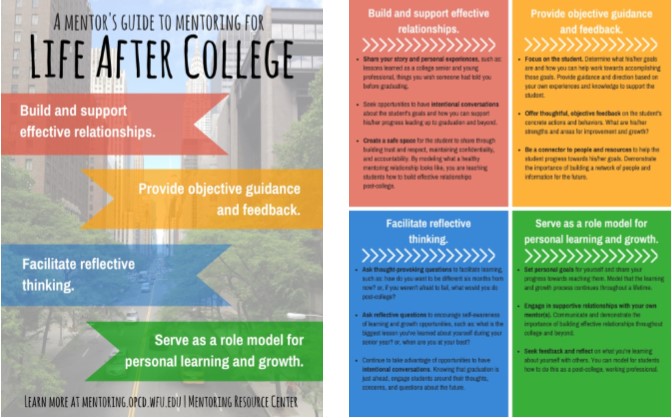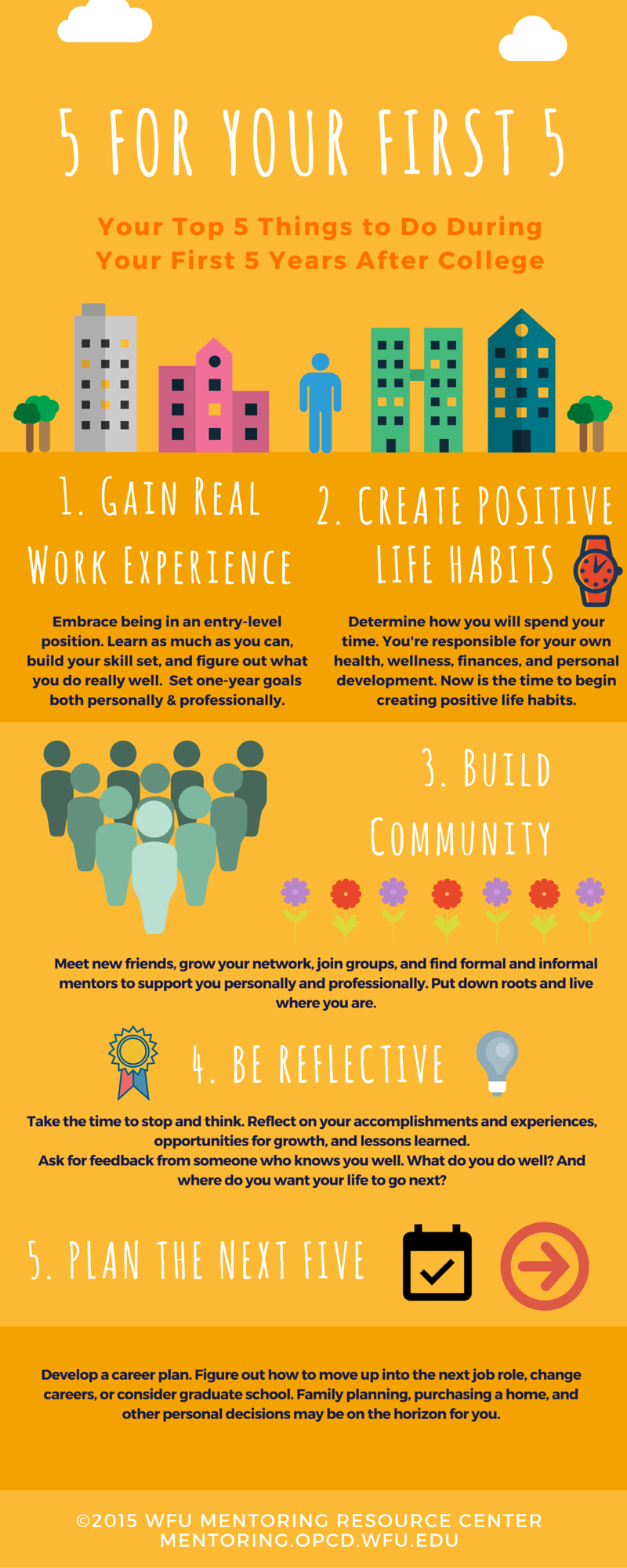National Mentoring Month 2016
Welcome to National Mentoring Month 2016! Each January we use this national spotlight on the importance of building effective mentoring relationships to highlight mentoring practices, programs, and relationships here on the Wake Forest campus. It is an opportunity to reflect on those relationships that are so important to our growth and development, to express appreciation for those who are invested in our lives, and to renew our commitment to one another and to this community.
This January, we are focusing on mentoring for life after college as part of our month-long celebration. While we know that mentoring relationships add tremendous value to the well-being and success of students during their four years at Wake Forest, we also believe that mentoring plays a large role in making a successful transition from senior year to life post-graduation. Knowing how to build supportive relationships, create and take ownership of your goals and successes, and to reflect on your growth experiences for future application are critical skills for navigating life after college.
This space provides both mentees and mentors with information, advice, and resources for building and engaging in mentoring relationships to support the college to “real world” transition. Click on the following to learn more:
Check out the following videos for insights from Wake Forest alumni who have personally benefited from mentoring relationships as they have navigated life as professionals after college. From learning how to build effective relationships to asking for and receiving feedback, our alumni share how mentors have helped them develop these key skills.
Build effective personal and professional relationships:
Ryan Smith (BA 2013)
Elizabeth Garrett (BA 2011)
Additional tips:
- Keep your commitments (do what you say you will do, show up, be punctual, be present) and maintain confidentiality within your personal and professional relationships
- Share your story – be willing to disclose your past and current experiences and future hopes and fears
- Seek out individuals who challenge your perspective and worldview – this will build your network
Set goals for personal growth and learning:
Tiffany Waddell (BA 2007, MA 2011)
Additional tips:
- Create developmental goals to work towards with action steps for each goal statement
- Share your progress towards goals with a mentor and ask for feedback on next steps
Ask for and receive feedback:
Caroline Naughton (BA 2011)
Additional tips:
- Share progress towards learning goals, challenges, and successes with a mentor
- Seek out individuals who can give feedback on your strengths and opportunities for growth
- Practice active listening – receive feedback without defensiveness, ask for clarity as needed, and express gratitude
Reflect on experiences and lessons learned for future application.
- Regularly set aside time to ask “what?”, “so what?”, and “now what?” questions
- Share reflection with a mentor, openly sharing learning moments and asking for feedback
- Create learning plan to build on your strengths and work on growth opportunities
Whether you’re interested in identifying a personal mentor to help you think through your transition from Wake Forest to the professional world, or would like to engage with your peers about planning for life after college, there are many options for you to get involved. Check out the following opportunities and resources for getting connected:
Senior Mentoring Groups: Interested in having conversations with your fellow Senior classmates about preparing for life after Wake Forest? Join one of our Senior Mentoring Groups this Spring. Look for more information coming soon!
Young Alumni Mentoring Groups: If you’re graduating this Spring and looking to connect with other Wake Forest alumni, consider starting or joining a young alumni mentoring group in your new city. Contact us to learn more.
How Do I Find a Mentor: Consider identifying a faculty or staff member, alumnus, internship supervisor, or older peer who may be a good fit to serve in a more formal mentoring role with you. Think about: Who is that person you naturally go to for advice when you need to make a decision? Who is someone you look up to as a role model? Who is the person you admire or aspire to become? These are great potential mentors, and they may already be serving in that role, without either of you realizing it. Some questions to ask yourself, before you ask someone to be your mentor: Why do you want them to be your mentor? What are you willing to do, as part of the mentoring relationship? What are your expectations for the mentoring relationship? Be as specific as possible. Only after you have specific answers to these questions should you approach them and ask if they are willing to engage in a formal mentoring relationship with you.
Looking for more information? Check out these tips on how to find a mentor. Additionally, you may find the advice in this article helpful.
Whether you are a mentor through a formal mentoring program or serve in an informal mentor capacity, you most likely have opportunities to engage with students in conversation about life after Wake Forest. Where to live, what career path to take, who to be friends with, and how to make important decisions around time, finances, and relationships are just a few of the things seniors and recent graduates grapple with as they think about their post-college life. Check out the following guide for resources and tips on how to mentor and prepare students for life beyond Wake Forest.

Download as a PDF document here.
© 2015 Wake Forest University Mentoring Resource Center
Once you graduate and begin your personal and professional life away from Wake Forest, then what? Check out our list below for the top five things to be doing throughout your five years post-college.


